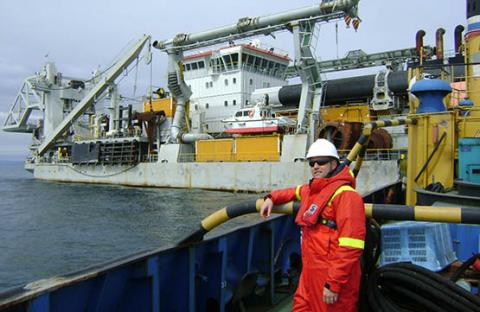
Coast & Harbor Engineering, a division of Hatch Mott MacDonald
In a typical month, I develop designs for a variety of coastal projects such as shore protection, dredging, habitat restoration and waterfront design for port infrastructure.
Education
- B.S., Ocean Engineering, Texas A&M University
Contact
What is your current job and what does it entail?
I am a senior coastal engineer at Coast & Harbor Engineering, a division of Hatch Mott MacDonald, and I manage the firm’s office in Corpus Christi, Texas. In a typical month, I develop designs for a variety of coastal projects such as shore protection, dredging, habitat restoration and waterfront design for port infrastructure. I provide this coastal engineering consulting service to a wide range of clients in Texas and nationwide. Although I specialize in dredging design, I also analyze coastal processes, perform wave modeling, and develop plans, specifications and cost estimates. I use my marine design experience to design coastal and waterfront structures including boat launch facilities, docks, bulkheads, floating breakwaters, modular block wall systems, living shorelines, navigation aids and mooring buoys. Additionally, I plan, manage and provide quality control and construction oversight services related to these projects. Within a typical year, I am managing construction projects with contractors that span from local small business owners to international marine contractors overseas. I am a licensed professional engineer in Texas, Louisiana and Washington.
What was the key factor in your career decision?
I actually started out as a computer engineering major at Texas A&M, but realized that I did not want a career where I was staring at a computer screen all day long. I grew up fishing and surfing along the Texas coast so it was just natural that I enter into a field that combined my growing interest in engineering with my passion for the ocean and coast. Even though I do my fair share of driving the desk these days, I also get out on site visits and oversee construction.
What do like most about your career?
I never work on the same type of project twice. There is always so much variation on each project that one dredging or shore protection project is completely different from the next. The coastal environment is so varied and chaotic; developing engineered solutions always keeps my skills sharp.
What do you like least about your career?
Politics. Politics is a necessary evil as it keeps funds flowing for a number of beneficial projects, but I have seen politics and agendas stop a great engineering design in its tracks, only to be put on a shelf to collect dust. Best thing to do is learn how to play the game, but stick to your professional judgment.
What do you do to relax?
Anything coastal: Surfing, fishing, sailing, floundering or just being barefoot on the beach. I also enjoy camping, bow hunting and playing guitar, bass and drums. Nothing beats having a good beverage with my wife, family and friends.
Who are your heroes/heroines?
I look up to my parents for the pointed guidance over the years to shape who I am today. Others are Hunter S. Thompson, Stanley Kubrick and countless musicians.
What advice would you give a student who expressed an interest in pursuing a career in your field?
Do a least one internship while getting your education, a taste of the real world outside academia will help your professional development early in your career. I am now working for my fourth employer in almost 13 years since graduation and it has given me appreciation for good company policies and experience. I suggest getting the widest variety in employers early while staying in the same field in order to get a good feel of who the best employer will be for your career goals. Most importantly, never stop learning.
Are career opportunities in your field increasing or decreasing and why?
Career opportunities are fairly steady in the field of coastal engineering. Waves, hurricanes, floods, and erosion will always affect coastal communities and infrastructure. With more and more of the world’s population living and vacationing on the coasts, careers that aim to protect, and develop, these shorelines, waterfronts and recreational areas will only continue to grow.
What will you be doing 10 years from today?
I will hopefully be working on a challenging dredging or coastal engineering project and helping young engineers with their own career paths.

